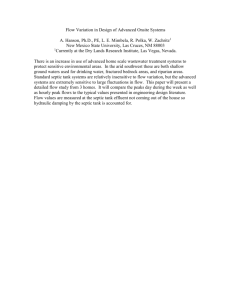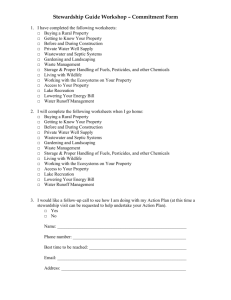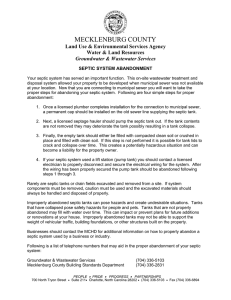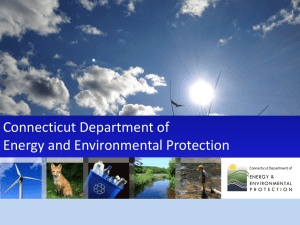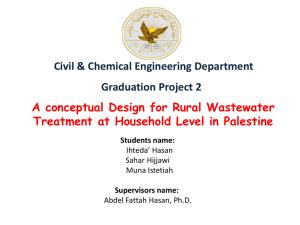Requirements for Mining and Construction
advertisement
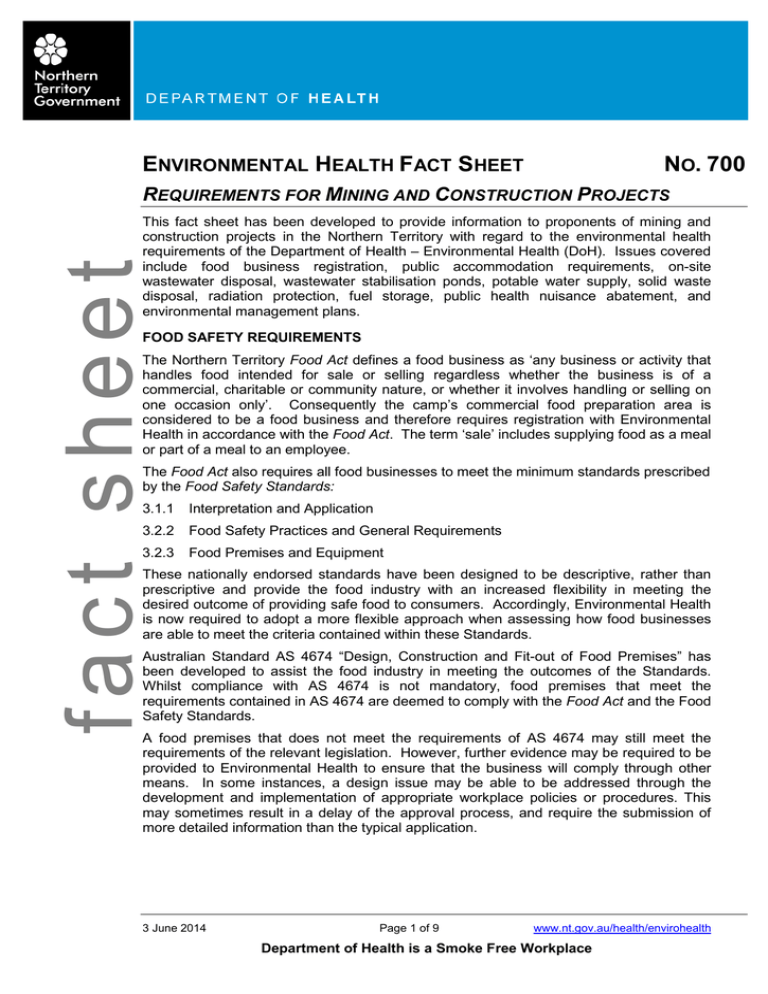
ENVIRONMENTAL HEALTH FACT SHEET NO. 700 REQUIREMENTS FOR MINING AND CONSTRUCTION PROJECTS fact sheet This fact sheet has been developed to provide information to proponents of mining and construction projects in the Northern Territory with regard to the environmental health requirements of the Department of Health – Environmental Health (DoH). Issues covered include food business registration, public accommodation requirements, on-site wastewater disposal, wastewater stabilisation ponds, potable water supply, solid waste disposal, radiation protection, fuel storage, public health nuisance abatement, and environmental management plans. FOOD SAFETY REQUIREMENTS The Northern Territory Food Act defines a food business as ‘any business or activity that handles food intended for sale or selling regardless whether the business is of a commercial, charitable or community nature, or whether it involves handling or selling on one occasion only’. Consequently the camp’s commercial food preparation area is considered to be a food business and therefore requires registration with Environmental Health in accordance with the Food Act. The term ‘sale’ includes supplying food as a meal or part of a meal to an employee. The Food Act also requires all food businesses to meet the minimum standards prescribed by the Food Safety Standards: 3.1.1 Interpretation and Application 3.2.2 Food Safety Practices and General Requirements 3.2.3 Food Premises and Equipment These nationally endorsed standards have been designed to be descriptive, rather than prescriptive and provide the food industry with an increased flexibility in meeting the desired outcome of providing safe food to consumers. Accordingly, Environmental Health is now required to adopt a more flexible approach when assessing how food businesses are able to meet the criteria contained within these Standards. Australian Standard AS 4674 “Design, Construction and Fit-out of Food Premises” has been developed to assist the food industry in meeting the outcomes of the Standards. Whilst compliance with AS 4674 is not mandatory, food premises that meet the requirements contained in AS 4674 are deemed to comply with the Food Act and the Food Safety Standards. A food premises that does not meet the requirements of AS 4674 may still meet the requirements of the relevant legislation. However, further evidence may be required to be provided to Environmental Health to ensure that the business will comply through other means. In some instances, a design issue may be able to be addressed through the development and implementation of appropriate workplace policies or procedures. This may sometimes result in a delay of the approval process, and require the submission of more detailed information than the typical application. 3 June 2014 Page 1 of 9 www.nt.gov.au/health/envirohealth Department of Health is a Smoke Free Workplace APPROVAL PROCESS fact sheet The approval process of a food business is dependent on its location; however it generally involves at least one inspection. Mining and construction camps are often located in remote areas where Building Control in terms of the Building Act is not applicable. Building Control essentially means that a Building Certifier must certify all building structures to ensure compliance with the Building Code of Australia. Proponents are referred to Appendix 1 to determine if their project is located within a Building Control Area. Inside a Building Control Area Under the provisions of the Building Act, Environmental Health is a Reporting Authority and as such, Building Certifiers are required to seek Environmental Health’s comments on all building applications involving, amongst other things, new or existing food businesses. The Building Certifier must submit detailed plans to the relevant Environmental Health Office prior to the construction of works. Following assessment and approval, the food business must be registered with the relevant Environmental Health Office prior to operating. Outside a Building Control Area Building Certification does not apply outside building control areas Environmental Health becomes the first point of contact for approval of a food business. The proponent must submit detailed plans and specification to the relevant Environmental Health Office prior to the construction of works. Following assessment and approval, the food business must be registered with the relevant Environmental Health Office prior to operating. STAFF ACCOMMODATION AND SANITARY FACILITIES Approval Process The approval process for staff accommodation is dependent on its location in a similar manner to food businesses, and also generally involves at least one inspection. Mining and construction projects are often located in remote areas where Building Control in terms of the Building Act is not applicable. Building Control essentially means that a Building Certifier must certify all building structures to ensure compliance with the Building Code of Australia. Proponents are referred to Appendix 1 to determine if their project is located within a Building Control Area. Inside a Building Control Area Under the provisions of the Building Act, Environmental Health is a Reporting Authority and as such, Building Certifiers are required to seek Environmental Health’s comments on relevant building applications. The Building Certifier must submit detailed plans to the relevant Environmental Health Office prior to the construction of works. Outside a Building Control Area Building Certification does not apply outside a building control area and Environmental Health becomes the first point of contact for approval. The proponent must submit detailed plans and specification to the relevant Environmental Health Office prior to the construction of works. Legislative Requirements Under the Public and Environmental Health Act 2011 all public accommodation including staff accommodation must be maintained in a good state of repair and in a clean and Page 2 of 9 Department of Health is a Smoke Free Workplace sanitary condition so as not to cause a public health nuisance. The Public and Environmental Health Guidelines for Public Accommodation outline the general requirements for conducting a public accommodation business such as the need to prevent overcrowding and provide an acceptable standard of sanitation, amenity and safety. Sanitary Facilities fact sheet Adequate numbers of sanitary facilities are to be provided in accordance with Building Code of Australia and relevant Northern Territory legislation. ENVIRONMENTAL MANAGEMENT PLANS The proponent shall provide the relevant Environmental Health Office with copies of Environmental Management Plans (EMP) that relate to the camp or project operations for initial comment, e.g. Construction Environmental Management Plan. Specifically, an EMP provides a brief description of the environmental issues relative to the project; a risk assessment on these issues; and control measures for each of the issues highlighted as well as responsibilities, timing, performance indicators and emergency controls. ON-SITE WASTEWATER DISPOSAL On-site wastewater disposal using septic tank systems is likely to be the most suitable option for remote camps that have no major site constraints and comprise less than 20 staff. Larger camps may need to consider other options such as a treatment plant or waste stabilisation ponds. For camps based in town areas, connection to the town’s reticulated sewerage is required. In all cases, the proponent should seek advice from a qualified hydraulic consultant about the most suitable wastewater disposal system. Reliability and low maintenance costs of remote on-site wastewater disposal systems should not be underestimated. The design of septic tank systems is detailed in the Northern Territory Code of Practice for On-site Wastewater Management (the Code). The Role of Regulatory Authorities Local Government Authorities in the Northern Territory have no jurisdiction over on-site wastewater management, i.e. approval or monitoring of septic tank installations. The Department of Lands, Planning and the Environment (DLPE) administer the provisions of the Building Act and Regulations with respect to all septic tank installations within a Building Control Area. DoH administers the provisions of the Public and Environmental Health Act & Regulations with respect to the: • product approval of septic tanks and associated products • conventional septic tanks located outside Building Control Areas • notification to install an Alternative Septic Tank System (ASTS) for a single residential dwelling • wastewater works design approval of an ASTS. Conventional Septic Tanks & Alternative Septic Tank Systems Conventional Septic Tanks (e.g. septic tank reticulating to absorption trenches or an evapotranspiration bed) must be installed by self-certifying plumbers and drainers within Page 3 of 9 Department of Health is a Smoke Free Workplace Building Control Areas or by licensed plumbers and drainers outside Building Control Areas. The administrative process is dependent on whether the installation is located within a Building Control Area (urban areas and along main highways) or outside a Building Control Area (remote areas). fact sheet Alternative Septic Tank Systems (ASTS) are septic tank systems that treat effluent to a higher quality than that offered by conventional septic tank system. For example, these include Aerated Wastewater Treatment Systems (AWTS), Composting Toilets, and Hybrid Systems. In addition to the self-certification of the installation, ASTS require either a notification to install or wastewater works design approval. Septic tank application forms can be downloaded online or by contacting the relevant Environmental Health Office: http://www.health.nt.gov.au/ > Environmental Health > Wastewater Management Connection to existing Septic Tank Systems If the proposal can utilise existing infrastructure such as septic tank systems, then the proponent will need to demonstrate that such infrastructure has adequate hydraulic capacity. This will require the proponent to engage a qualified hydraulic consultant to provide the relevant Environmental Health Office with as-constructed drawings of the existing infrastructure. TRADE WASTE PRE-TREATMENT DEVICES Trade waste is defined as a “liquid or liquid borne waste generated from any industry, business, trade, manufacturing process or similar that is approved for discharge to sewer but does not include wastewater from a toilet, shower, hand basin or similar fixture”. It is not recommended that trade waste be discharged to a septic tank system, however commercial food premises at the camp may prepare cooked food generating liquid trade waste that includes food scraps, detergents, fats, oils and grease. This liquid trade waste has a substantial impact on a septic tank system, and if not contained by pre-treatment equipment will cause system failure. For this reason, it is mandatory that all greasy liquid trade waste be discharged to sewer via a pre-treatment device that has been approved by Power and Water Corporation’s Trade Waste Section. Power and Water Corporation’s requirements for trade waste pre-treatment devices can be downloaded online: http://www.powerwater.com.au/ > Networks and Infrastructure > Water and Sewerage Services > Trade Waste and Environmental Health’s fact sheet on trade waste pre-treatment devices can be downloaded online: http://www.health.nt.gov.au/ > Environmental Health > Wastewater Management WASTE STABILISATION PONDS Waste stabilisation ponds (also known as sewage ponds) are used extensively in the Northern Territory for the treatment of wastewater prior to final disposal. There is legislation to control the reuse or disposal of treated sewage effluent. The responsibility for enforcement of such legislation is vested with Environmental Health and the Northern Territory Environment Protection Authority (NT EPA). The discharge of Page 4 of 9 Department of Health is a Smoke Free Workplace treated sewage effluent to land or water may therefore occur, but only in accordance with pertinent legislation, or in its absence, to any reasonable conditions imposed by the relevant government agency. fact sheet Where treated sewage effluent is proposed to be discharged to a waterway and where the discharge does not have a potential to impact on public health, Environmental Health will liaise with the NT EPA as part of the approval process. Consideration will be given to the reuse/irrigation of treated sewage effluent in controlled public access areas, constructed and operated for this express purpose. Approval Process Any proposal to construct waste stabilisation ponds at a camp shall require the submittal of plans, design specifications and disposal methodology to both the relevant Environmental Health Office and NT EPA for approval, prior to construction. Environmental Health will seek specific comment with regard to mosquito breeding from the DoH Medical Entomology Branch. POTABLE WATER SUPPLY Managers of private water supplies (e.g. rainwater tanks or private bores), should have their water routinely analysed to ensure that their water is safe as part of their risk management routine. If water is provided to staff the potable water supply should comply with the 2011 NHMRC Australian Drinking Water Guidelines (ADWG). The Australia New Zealand Food Safety Standards require every Food Business to be supplied with potable water, which is particularly relevant to premises utilising private water supplies. For the purpose of the annual Food Act registration it is necessary for Food Business owners to demonstrate to Environmental Health that they have a potable water supply. To this end it will be necessary for proponents to arrange for a certified analysis of the water to confirm the water meets the requirements of the ADWG, i.e. an annual credible analysis of a kitchen tap sample showing “pass” in total coliform and E. coli. To simplify this task, arrangements have been made with the NTG Water Microbiology Laboratories at Berrimah and Alice Springs to provide analytical services. They can be contacted on the numbers below to arrange the supply of prepared sample bottles and to book times for samples to be delivered. Note that the proponent will need to meet the costs for the testing of samples. • Alice Springs – Department of Primary Industry and Fisheries - located at Arid Zone Research Institute, phone (08) 8951 8110 • Darwin – Department of Primary Industry and Fisheries - located at Berrimah Farm, phone (08) 8999 2346 The results of analysis for your sample should be returned to the relevant local Environmental Health Office where the project is located. Please note that this is the minimum evidence to ensure that water is potable. In addition a general chemical and metals analysis should also be undertaken. Once an initial sample has been submitted and if the selected metals, nitrite, nitrate and fluoride concentrations are below ADWG health thresholds repeat testing for the selected chemicals and metals will only be necessary every five years. Some private supplies will require further examination and will be visited by Environmental Health after the analysis is complete. Page 5 of 9 Department of Health is a Smoke Free Workplace BORES Bores should be constructed to the standards outlined in the 3rd edition of the Minimum Construction Requirements for Water Bores in Australia, 2012. Bore setbacks to onsite wastewater disposal shall be in accordance with the Code. FUEL STORAGE fact sheet Camps and their respective operations generally have a fuel storage facility. Environmental Health does not regulate fuel storage and therefore proponents should discuss this issue with NT EPA. Reference should be made to AS 1940-2004 (and amendments) Storage and handling of flammable and combustible liquids. OCCUPATIONAL HEALTH AND SAFETY The Department of Health does not regulate occupational health and safety. Mining and construction projects are expected to comply with NT WorkSafe legislation throughout their entire construction and operation phases. SOLID WASTE DISPOSAL The Waste Management and Pollution Control Act requires that certain waste management activities be licensed or approved by NTEPA. An NTEPA approval for a landfill (rubbish dump) is not required if the landfill is for domestic waste generated on the premises or domestic waste from temporary construction camps. An NT EPA licence for a landfill is required if the camp serves a permanent population of more than 1000 persons or if the project operations generate hazardous waste. Further information can be obtained by contacting NT EPA on (08) 8924 4139 or by going to their website: http://www.nt.gov.au/nreta/environment/index.html > Approvals and Licences Providing the landfill does not have to be licensed or approved by NT EPA, then the proponent will still need to demonstrate to the relevant Environmental Health Office that the camp’s landfill meets best practice and will not cause an environmental or public health nuisance. Reference should be made to the Guidelines for Siting, Design and Management of Solid Waste Disposal Sites in the Northern Territory 2003 which can be downloaded from the NT EPA website: http://www.nt.gov.au/nreta/environment/index.html > Waste and Pollution Guidelines RADIOACTIVE SOURCES The Radiation Protection Act applies to servicing, testing, installing, decommissioning, manufacturing, possessing, using, storing, transporting, disposing of or otherwise dealing with a radiation source. A radiation source is defined in the Act. The provisions of the Radiation Protection Act will apply if any part of the project includes the use of radiation sources. The Act covers safe control of the use of all radiation sources, both ionising and non-ionising. The source can be radiation apparatus or radioactive material. Natural sources of radiation may be included in the definition if radiation exposure results from the enterprise. Generally, unmodified concentrations of radioactive material in most raw materials are not included unless there is a possibility of significant radiation exposure. If the unmodified concentration is below concentrations of radioactivity as listed in the latest edition of the National Directory for Radiation Protection, that material is not defined as radioactive. Page 6 of 9 Department of Health is a Smoke Free Workplace Notwithstanding, the Radiation Protection Act is not expected to apply to any proposal in which the most exposed person could not receive a radiation dose that is greater than 1mSv per year. PUBLIC HEALTH NUISANCE ABATEMENT fact sheet The proponent shall ensure that the construction and operation of the camp does not create a public health nuisance, in particular from dust or other particulate matter. Environmental Health has provisions to deal with public health nuisances under the Public and Environmental Health Act. Any release to ground or surface water in excess of that prescribed by the NT EPA waste discharge licence should trigger an impact study which includes an analysis of potential risks to public health including impacts on drinking water supplies and bioaccumulation of metals or other identified parameters from the discharge in fish. INSURANCE IMPLICATIONS Failure to follow the relevant approval processes and fire safety requirements may invalidate a proponent’s building insurance policy. FOR FURTHER INFORMATION CONTACT ENVIRONMENTAL HEALTH ON 1800 095 646 OR YOUR LOCAL OFFICE Email: envirohealth@nt.gov.au GREATER DARWIN REGION & TOP END REMOTE 2nd Floor, Casuarina Plaza Casuarina PO Box 40596 CASUARINA NT 0811 Phone: (08) 8922 7377 Fax: (08) 8922 7036 BARKLY Health Development Building Cnr Schmidt & Windley Sts, Tennant Creek PO Box 346 TENNANT CREEK NT 0861 Phone: (08) 8962 4302 Fax: (08) 8962 4420 KATHERINE Ground Floor, O’Keefe House Katherine Hospital PMB 73 KATHERINE NT 0851 Phone: (08) 8973 9061 (08) 8973 9062 Fax: (08) 8973 9063 CENTRAL AUSTRALIA Peter Sitzler Building 67 North Stuart Highway, Alice Springs PO Box 721 ALICE SPRINGS NT 0871 Phone: (08) 8955 6122 Fax: (08) 8952 5927 EAST ARNHEM Community Health Building Endeavour Square, Nhulunbuy PO Box 421 NHULUNBUY NT 0881 Phone: (08) 8987 0440 (08) 8987 0441 Fax: (08) 8987 0444 Page 7 of 9 Department of Health is a Smoke Free Workplace Appendix 1 EXPLANATION OF BUILDING CONTROL AREAS Building Control Areas in the Northern Territory are those areas declared under the Building Act by the Minister for Planning. fact sheet Whilst some aspects of the Building Act apply to all of the Northern Territory, building control is only affect in gazetted Building Control Areas. The extent of the gazetted Building Control Areas is detailed in the map of the building areas in the Northern Territory (overleaf). The current Building Control Areas include: (a) Adelaide River Alice Springs Batchelor Borroloola Brewer Estate Darwin Elliott Jabiru Katherine Katherine Gorge National Park Kings Canyon Lake Bennett Larrimah Mataranka Namarada Pine Creek Tennant Creek Ti -Tree Timber Creek Yulara NOTE: • Detailed maps of these areas can be obtained from the Building Advisory Services Branch at Department of Planning & Infrastructure. BASB can be contacted in Darwin (Cavenagh House) on 8999 8965 or Alice Springs (Alice Springs Plaza) on 8951 9200. • The township of Nhulunbuy is not a Building Control Area (b) Land within 500 m of each side of the road reserve of the highways and roads detailed on the map of the building areas in the Northern Territory. NOTE: • Where there are no road reserves then the distance is measured from the centre line. Page 8 of 9 Department of Health is a Smoke Free Workplace fact sheet Page 9 of 9 Department of Health is a Smoke Free Workplace
